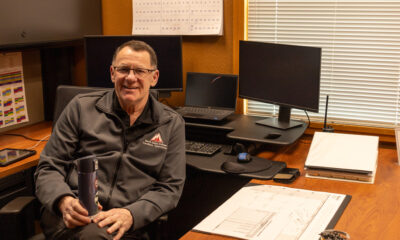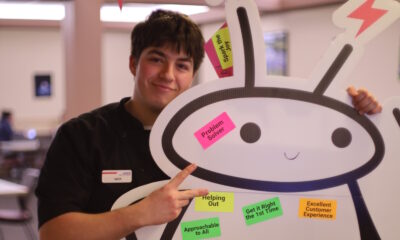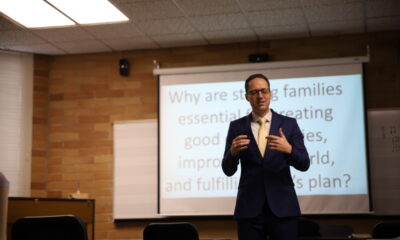Features
A time for intellect
Merriam Webster defines philosophy as, “ The study of ideas about knowledge, truth, the nature of meaning of life, etc.” When you think about it, you probably come to the realization, if you haven’t already, that you use philosophy every day, especially as a college student. So it seems only natural that some very hard-working NIC students founded the NIC Philosophy club, to promote philosophy and critical thinking among students on campus. All students are welcome, as long as they come with an open mind, and the will to learn.
I recently had the chance to sit down with two of the club’s charismatic council members, club vice president Stephen Troxel, and club president Dave McKerracher. The two friends were eager to chat about their project, and to shed more light upon what goes on inside of the Philosophy Club.
Sentinel: Hey guys thanks for letting us interview you. I’m going to start with a very general question: What is the purpose of Philosophy Club?Philosophy club
Stephen: Oh, I know Dave has an answer for this..
Dave: Firstly, to promote philosophy on campus. Second, to provide a forum for intellectual discussions, learning about the exchanging of intellectual ideas.
Stephen: Yeah, a place for inspiring intellectuals to grow!
Dave: …Because most places if you hang out and want to talk about things like this, most people are going to assume that you’re being pretentious, when in reality, all we’re trying to do is understand different points of view. That being said, if you come into the club with a specific world-view that you’re very attached to, you’re not going to last long. We want to bring in structured debates, professional lecturers, movie analyses, all while drinking coffee.
Sentinel: Wow, I really need to come hang out with you guys.
Stephen: Do it!
Sentinel: The club is now affiliated with the Secular Student Alliance. What encouraged you to become part of that?
Dave: They offer many great resources and opportunities, and I’d say that the large majority of the club is secular. The club members who aren’t secular understand that to have an intellectual discussion with people from different walks of life, there has to be a sort of common meeting place, and that’s what secularism provides. One person could be Buddhist, the other Islamic, and both could agree about secular ideals on some degree.
Sentinel: So what are some of the opportunities that the SSA provides?
Dave: The SSA offers a speaking bureau. Which means that we get access to lectures from over one hundred speakers at no cost.
Sentinel: So with all of these speakers, does it ever feel like philosophy club is just an extra class that you’re not getting credit for?
Stephen: If you’re electing yourself to go, I think that you’re going to enter philosophy club with a different mindset. Where with class, you HAVE to go, so it’s a different vibe. But also, what makes it a lot less like class, is that there’s a lot more exchange between the students and the professors. There’s usually a solid discussion after every lecture.
Sentinel: Alright cool…Describe how a typical philosophy club meeting operates.
Dave: Well first of all, it takes a lot of planning and coordination within our council. If it weren’t for Megan McCain, Joe Graham, Adrianna Varbero, and Thomas Combstock, philosophy club would be no where near where it is today. That being said, there are two kinds of meetings; lecture, or general meeting. In lecture meetings, we have a lecture, and then afterwords we talk about it. It’s cool, because during the lectures, everyone kind of saves up their ideas they want to talk about, until after the lecture is over, and then it’s kind of an explosion of conversations all over the room. For general meetings we tend to show up and discuss, more in depth, what the last lecture was over.
Sentinel: So, speaking of lectures, I understand that you guys are about to finish a series of lectures on Karl Marx. Does that make you all certified communists or what?
Stephen: (Laughs) No, I’m sure that’s what everyone thinks though.
Dave: We actually chose him not only because he’s such a misunderstood philosopher, but also, because we thought it would keep away people (from our discussions) that are so close-minded as to think that we would automatically be talking about communism.
Sentinel: Did it work?
Stephen: For the most part, yes.
Sentinel: So what does the future have in store for philosophy club?
Dave: Well, right now we have a huge focus on doing club collaborations. So far we’ve done a few collaborative events with clubs such as the Sociology Club and the NIC Republicans Club. In addition we’re planning on attending more off campus events and lectures, and having more speakers provided to us through the SSA. We’re also going to be watching more films!
Sentinel: Alright, cool. The question that I wanted to end on is just a sort of general philosophy question, and that is; How useful is philosophy in every day life?
Dave: Very! I want Stephen to go first because he’s not even a philosophy major, so I want to hear what he has to say.
Stephen: I like the saying; “Whatever you give to philosophy you will get back ten-fold.” Because, when you really commit to it, you can see so many applications of it day to day. It’s hard to draw a specific example because it’s just so constant, and you view the world in a different way. At least I do.
Dave: Besides making life interesting in general, because, honestly, I have not been bored since I’ve gotten in to philosophy. It also gives us a high level of reading comprehension, clarity of thought, and good communications skills. Socrates said that the unexamined life is not worth living. Some people would argue that, but they’ve probably not examined much of life. Once you go down that rabbit hole, there’s no coming back, because life is just that much more interesting with philosophy.
The managing editor of the NIC Sentinel. Tyson is on his third year at the newspaper and is skilled in different journalism subjects. He is also skilled at underwater basket weaving and juggling chainsaws.












